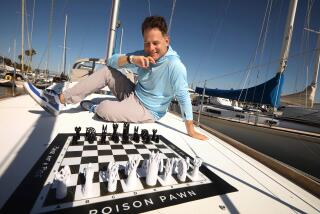Match Proves Internet Can Be King
- Share via
NEW YORK — In the Internet’s long struggle to establish itself as a big-league medium, the man-vs.-machine chess match that concluded here Sunday is emerging as a watershed event, a perfect demonstration of how the global computer network can be more powerful even than television.
IBM, which sponsored the six-game series in which its supercomputer-powered chess system, Deep Blue, defeated world champion Garry Kasparov, said the match was one of the most popular events ever staged on the Internet.
The computer network’s graphical, interactive and audience-targeting capabilities make it ideal for chess, which attracts a passionate--though limited--audience that wants not just to watch but to kibitz, even participate if possible.
The official World Wide Web site for the match (https://www.chess.ibm.com) registered more than 74 million “hits” from 106 countries over nine days, which translates to more than 4 million visits by individual computer users, IBM spokesman Jeff Cross said.
On Sunday, the day of the final game--a crushing, 19-move victory for Deep Blue--there were 8.9 million hits and approximately 420,000 user visits, which compares favorably with the viewership of some cable TV programs.
“It was one of the first successful events where the Internet was the primary medium for coverage,” said Ken Clemmer of Forrester Research in Cambridge, Mass., which is analyzing how the chess match might be a prototype for other, possibly advertiser-supported programs on the Internet.
Previous activities--notably the Olympic Games, the Super Bowl and the Oscars--have attracted millions of hits at related Web sites, but those audiences are minuscule compared with the TV viewership.
For the chess match, on the other hand, if you couldn’t be present in the 500-seat auditorium in Manhattan with its grandmaster commentators and towering video screens, the only way to experience the game in progress was online.
Nowhere were the unique possibilities of the medium better displayed than in the case of Tim McGrew.
McGrew, a philosophy professor at Western Michigan University, won instant fame among chess buffs by being first to discover a fatal blunder by Kasparov in controversial Game 2. The error, which caused Kasparov to resign when he should have got a draw, was a pivotal point in the match.
It was somewhat equivalent to a fan spotting a critical rules infraction on Monday Night Football that escapes the attention of referees, players and announcers alike. But unlike the football fan who can only launch a pillow at the TV in disgust, McGrew immediately shared his ideas with chess experts in an Internet discussion group and, before the night was over, got the attention of Kasparov aides and scientists on the Deep Blue team.
Both Kasparov and the computer confirmed McGrew’s discovery. Although it didn’t change the result of the game, it had a profound effect on the champion’s psychology and was one of the things he mentioned in his bitter remarks at the close of the contest.
“This is the Internet waking up,” McGrew said. “It shows that the resource is available for collaborative effort.”
For IBM, Deep Blue’s victory burnished the company’s image as a technological leader. But a less obvious thing the event did was provide IBM with a way to test its ability to handle a complex, high-volume event on the Internet.
“You can’t replicate these conditions in the laboratory,” Cross said.
In the February 1996 contest between Kasparov and an earlier version of Deep Blue--won fairly easily by Kasparov--IBM’s Internet equipment couldn’t take the unexpected crush of traffic on the first day and it temporarily seized up.
This time, although there were minor snafus, chess and computer buffs said the ambitious IBM site operated creditably. One of its features was a graphical chessboard animated through Java software to move the pieces in sync with Kasparov and Deep Blue. Helping to handle the traffic was an IBM RS/6000 SP supercomputer--the same model as the machine at the heart of Deep Blue.
To ensure there would be plenty of traffic, IBM blanketed the Web with what may have been the biggest single-event ad campaign ever conducted on the Internet, placing “clickable” banner ads at 50 Web sites.
Internet ads typically induce only 1% to 2% of computer users who see them to click on them with their mouse for more information. However, Cross said the “clickthrough” response to the chess campaign was extraordinarily strong, ranging from 8% to 13%.
Other ventures benefited as well. The Internet Chess Club (https://www.chessclub.com) saw traffic from its regular members increase threefold and also got a surge of new members, according to co-founder Gregory Belmont.
While IBM is noncommittal about the future of the Deep Blue project and whether it will give Kasparov the rematch he has asked for, the scientist who led the team that developed the chess system, C.J. Tan, said in an interview this week that the company would answer many a chess buff’s prayer.
“We are very interested in putting Deep Blue on the Internet for people to play it,” said Tan, adding that such a hook-up will likely be in place by the end of the year.
More to Read
Sign up for Essential California
The most important California stories and recommendations in your inbox every morning.
You may occasionally receive promotional content from the Los Angeles Times.










